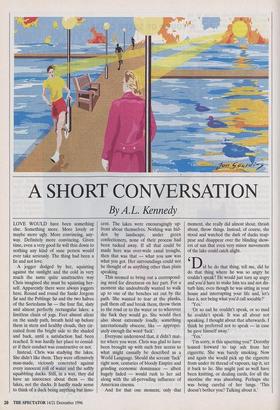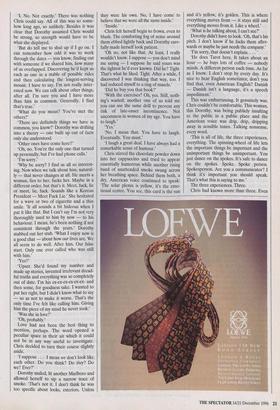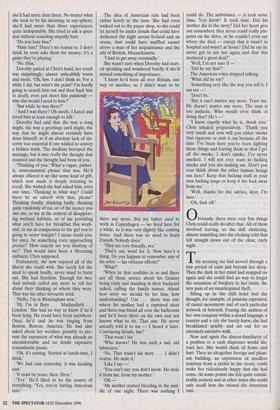A SHORT CONVERSATION
By A.L. Kennedy
LOVE WOULD have been something else. Something more. More lovely or maybe more ugly. More convincing, any- way. Definitely more convincing. Given time, even a very good lie will thin down to nothing any kind of sane person would ever take seriously. The thing had been a lie and not love.
A jogger dodged by her, squinting against the sunlight and the cold in very much the same quite unattractive way Chris imagined she must be squinting her- self. Apparently there were always joggers here. Round and round the Sankt Jorgens So and the Peblinge So and the two halves of the Sortedams So — the four flat, slaty and almost perfectly rectangular lakes: a limitless chain of jogs. Feet almost silent on the sandy path, breath held up before them in stem and healthy clouds, they cir- cuited from the bright side to the shaded and back, until a satisfaction had been reached. It was hardly her place to consid- er if their conduct was constructive or not.
Instead, Chris was studying the lakes. She didn't like them. They were offensively man-made, viciously concreted against every innocent roll of water and the softly squabbling ducks. Still, in a way, they did have an innocence about them — the lakes, not the ducks. It hardly made sense to think of a duck being anything but inno- cent. The lakes were encouragingly up- front about themselves. Nothing was hid- den by landscape, under green confectionery, none of their process had been tucked away. If all that could be made here was over-wide canal troughs, then that was that — what you saw was what you got. Her surroundings could not be thought of as anything other than plain speaking.
This seemed to bring out a correspond- ing need for directness on her part. For a moment she undoubtedly wanted to walk up to one of the benches set out by the path. She wanted to tear at the planks, pull them off and break them, throw them to the road or to the water or to wherever the fuck they would go. She would then also shout extremely loudly, something internationally obscene, like — appropri- ately enough the word 'fuck'.
Everyone understood that, it didn't mat- ter where you went. Chris was glad to have been brought up with such free access to what might casually be described as a World Language. Should she scream 'fuck' right now, centuries of bloody Empire and grinding economic dominance — albeit hugely faded — would rush to her aid along with the all-pervading influence of American cinema.
And for that one moment, only that moment, she really did almost shout, thrash about, throw things. Instead, of course, she stood and watched the dark of ducks reap- pear and disappear over the blinding show- ers of sun that even very minor movements of the lake could catch alight.
'Did he do that thing, tell me, did he do that thing where he was so angry he couldn't speak? He would just turn up angry and you'd have to make him tea and not dis- turb him, even though he was sitting in your house and interrupting your life and, let's face it, not being what you'd call sociable?'
'Yes.'
'Or so sad he couldn't speak, or so mad be couldn't speak. It was all about not speaking. I thought about that afterwards. I think he preferred not to speak — in case he gave himself away.'
'Yes.'
'I'm sorry, is this upsetting you?' Dorothy leaned forward to tap ash from her cigarette. She was barely smoking. Now and again she would pick up the cigarette from under its thread of vapours, tap it, set it back to lie. She might just as well have been knitting, or dealing cards, for all the nicotine she was absorbing. Perhaps she was being careful of her lungs. 'This doesn't bother you? Talking about it.' 'I. No. Not exactly.' There was nothing Chris could say. All of this was so some- how long ago, so unlikely. Besides it was clear that Dorothy assumed Chris would be strong, so strength would have to be what she displayed.
'But do tell me to shut up if I go on. I can remember how odd it was to work through the dates — you know, finding out with someone if we shared him, how many of us overlapped. Discovering he'd kept us each as one in a stable of possible rides and then calculating the longest-serving mount. I have to say, I'm not really inter- ested now. We can talk about other things, after all. I'm sure you and I have more than him in common. Generally, I find that's true.'
'What do you mean? You've met the others?'
'There are definitely things we have in common, you know?' Dorothy was drifting into a theory — one built up out of facts only she understood.
'Other ones have come here?'
'Oh, no. You're the only one that turned up personally, but I've had phone calls.' 'I'm sorry.'
'Why be sorry? I find us all so interest- ing. Now when we talk about him, natural- ly — that never changes at all. He meets a woman, lies to her, fucks her. Maybe in a different order, but that's it. Meet, fuck, lie or meet, lie, fuck Sounds like a Korean President — Meet Fuck Lie.' She hesitated for a wave or two of cigarette and a thin smile. 'It all sounds a bit hideous when I put it like that. But I can't say I'm not very thoroughly used to him by now — to his behaviour. I mean, he's been nothing if not consistent through the years.' Dorothy stubbed out her stub. 'What I enjoy now is a good chat — about how our lives are. We all seem to do well. After him. Our false start. Only one ever called who was still with him.'
'Yes?'
'Upset. She'd found my number and made up stories, invented irrelevant dread- ful truths and everything was so completely out of date. I'm his ex-ex-ex-ex-ex-ex- and then some, for goodness sake. I wanted to put her right, but I didn't know what to say — so as not to make it worse. That's the only time I've felt like calling him. Giving him the piece of my mind he never took.'
Was she in love?'
'Oh, probably.'
Love had not been the best thing to mention, perhaps. The word opened a peculiar space in their air which it could not be in any way useful to investigate. Chris decided to turn their course slightly aside.
'I suppose . . . I mean we don't look like each other. Do you think? Do they? Do we? Ever?'
Dorothy smiled, lit another Marlboro and allowed herself to sip a narrow trace of smoke. 'That's not it. I don't think he was too specific about looks, exteriors. Unless they were his own. No, I have come to believe that we were all the same inside.' 'Inside.'
Chris felt herself begin to frown, even to blush. The comforting fog of noise around them ebbed lightly back and Dorothy care- fully made herself look patient.
'Oh no, not like that. At least, I really wouldn't know. I suppose — you don't mind me saying — I suppose he said yours was the tightest he'd ever known. Did he? Tight. That's what he liked. Tight. After a while, I discovered I was thinking that way, too. I had reduced myself to a ring of muscle.'
Did he buy you that book?'
'With the exercises? Oh, yes. Still, noth- ing's wasted; another one of us told me you can use the same drill to prevent any risk of late-onset incontinence. Not uncommon in women of my age. You have to laugh.'
'Yes.'
'No. I mean that. You have to laugh. Eventually. You must.'
'I laugh a great deal. I have always had a remarkable sense of humour.'
Chris stirred the chocolate powder down into her cappuccino and tried to appear essentially humorous while another rising band of unattended smoke swung across her breathing space. Behind them both, a dry, American voice continued to speak: 'The solar plexus is yellow, it's the emo- tional centre. You see, this card is the sun and it's yellow, it's golden. This is where everything moves from — it stays still and everything moves from it. Like a wheel.'
'What is he talking about, I can't see?'
Dorothy didn't have to look. `Oh, that's his pitch. I don't know if he fucks them after- wards or maybe he just needs the company.'
'I'm sorry, that doesn't explain. . . . '
'He does Tarot here. It takes about an hour — he buys lots of coffee — nobody minds. A different person each time. As far as I know. I don't stop by every day. It's nice to hear English sometimes; don't you find that, even American English? Danish — Danish isn't a language, it's a speech impediment.'
This was embarrassing. It genuinely was. Chris couldn't be comfortable. This woman, this Dorothy, was being publicly insulting to the public in a public place and the American voice was drip, drip, dripping away in sensible tones. Talking nonsense, every word.
'This is all of life, the three experiences, everything. The spinning-wheel of life lets the important things be important and the unimportant things be unimportant. You just dance on the spokes. It's safe to dance on the spokes. Spoke. Spoke person. Spokesperson. Are you a communicator? I think it's important you should speak. That's what this is saying to me.'
The three experiences. Three.
Chris had known more than three. Even
Maclii,1
she'd had more than three. No matter what she took to be his meaning; in any sphere, she'd had more than three experiences, quite indisputably. She tried to ask a ques- tion without sounding stupidly hurt.
'Do you hate him?'
'Hate him? There's no reason to. I don't think he even asks them for money; it's a game they're playing.'
'No. Him.'
Dorothy patted at Chris's hand, her touch was surprisingly, almost unhealthily warm and moist. 'Oh, him. I don't think so. For a while I did, but what's the point? I'm hardly going to search him out and then hack him to death; even just shoot him painlessly — why else would I need to hate?'
'But while he was there?'
'And I was there? Oh surely, I hated and loved him at least enough to kill.'
Dorothy had said that the way a song might, the way a greetings card might, the way that he might almost certainly have done himself: as if an absolute lack of sin- cerity was essential if one wished to convey a hidden truth. The medium betrayed the message, but it was really the thought that counted and the thought had been of you.
'Thinking of you.' What a vague, pathet- ic, noncommittal phrase that was. He'd always offered it up like some kind of gift, which now made it deeply irritating to recall. She wished she had asked him, even one time, 'Thinking in what way? Could there be an adverb with that, please? Thinking fondly, thinking badly, thinking quite randomly of me, or of the money you owe me, or me in the context of disappear- ing wetland habitats, or of me providing what you'll have for breakfast this week- end, or me in comparison to the girl you're going to screw tonight? I mean could you, for once, be something even approaching precise? How exactly are you thinking of me?' That would have been a liberating outburst, Chris supposed.
Fortunately, she now enjoyed all of the liberty she could wish. She rarely felt the need to speak loudly, never mind to burst out. She had freedom. Enough for two. And nobody called any more to tell her about their thinking or where they were. That was his other favourite trick.
'Hello, I'm in Birmingham now.'
'Hi, I'm in Bury . . . Machynlleth . . London.' She had no way to know if he'd been lying. He could have been anywhere. Once, he'd said he was ringing from Boston. Boston, America. He had also asked about her weather, possibly to pre- vent the expansion of what was already an uncomfortable and no doubt expensive transatlantic pause.
`Oh, it's raining. Started at lunch-time, I think.'
'We had rain yesterday, it was heading east.'
It must be yours, then. Here.'
'Yes.' He'd liked to be the source of everything. 'Yes, you're having American rain.' The idea of American rain had been rather lovely at the time. She had even walked out to the paper shop, so she could let herself be under clouds that could have darkened the night across Ireland and an ocean, that could have muffled sunset above a man of her acquaintance and the city of Boston, Massachusetts.
'I had to get away eventually.'
She wasn't sure when Dorothy had start- ed speaking and wondered briefly if she'd missed something of importance.
'I knew he'd been all over Britain, one way or another, so I didn't want to be there any more. But my father used to work in Copenhagen — we lived here for a while, so it was very slightly like coming home. And there was no need to learn Danish. Nobody does.'
'They are very friendly, yes.'
'That's one word for it. Now here's a thing. Do you happen to remember any of his solos — his virtuoso efforts?'
'What?'
'When he first confides in us and there are all those stories about his Granny being crazy and standing in their backyard naked, calling the family names. About how sorry we should be for him, how understanding? Urn . . . there was one where his mother had a ruptured ulcer and there was blood all over the bathroom and he'd been there on his own and not known what to do. That one. He never actually told it to me — I heard it later. Convincing details, hm?'
'That wasn't his.'
'Who knows? He was such a sad, old fabricator.'
'No. That wasn't his story . . . I didn't realise. He stole it.'
'Like I say —' 'You can't say: you don't know. He stole it from me, from my mother.'
'Oh —' 'My mother started bleeding in the mid- dle of one night. There was nothing I could do. The ambulance — it took some time. You know? It took time. Did his mother die in the story? Did her heart give out somewhere they never could really pin- point on the drive, so he couldn't even say where she died — except that it wasn't in hospital and wasn't at home? Did he say he never got to see her again and that this mattered a great deal?'
'Well, I'm not sure if—' 'Did he say that?'
The American voice stopped talking. 'What did he say?'
'Something very like the way you tell it. I am sor 'Don't be.'
'But it can't matter any more. Trust me. He doesn't matter any more. The man is too pathetic. Who would even think of doing that? He's —' 'I know exactly what he is, thank you.' Chris inhaled preparatively. 'Thank you very much and now will you either smoke that cigarette or stub it out because all the time I've been here you've been lighting those things and leaving them so that I get all the smoke. I don't smoke. I've never smoked. I will not ever want to fucking smoke and you are making me. Don't you ever think about the other human beings out here? Keep that fucking stuff in your own flicking lungs or keep it the fuck away from me.'
'Well, thanks for the advice, dear, I'm sure.'
'Oh, fuck off.'
Obviously, there were very few things Chris could really do after that. All of them involved leaving, so she did; clattering, almost stumbling into the choking cold that fell straight down out of the clear, early night.
This morning she had moved through a tiny period of calm just beyond her sleep. Then the dark in her mind had snapped on again and she could find no way to forget the sensation of burglary in her brain, the new pain of an unanticipated theft.
Sitting up in the chill hotel bed she thought, for example, of passions expressed, of casual movements and of each particular network of betrayal. Fearing the sadness of her own company within a closed language, a country and a city she barely knew, she had breakfasted quickly and set out for an extremely extensive walk.
Now and again the almost-familiarity of a postbox or a cash dispenser would dis- tract her. She would think of home and hurt. Then an altogether foreign and pleas- ant building, an expression of needless courtesy from a cyclist in the street, could make her ridiculously happy that she had come. At some points she felt quite consid- erably content and at other times she could only recall how she missed the American rain.




















































































































 Previous page
Previous page